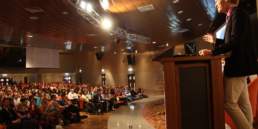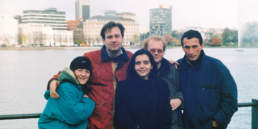AEGEE-Zaragoza is organizing already its second Agora this autumn. But how did it all start? What are the origins of the biggest antenna in Spain? The Golden Times asked the founder of AEGEE-Zaragoza, Alberto Alonso Clavero (43), how he made this little AEGEE miracle happen.
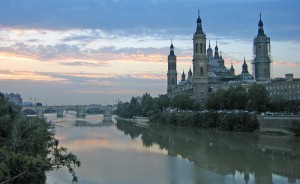
Golden Times: How did you hear about AEGEE for the first time?
Alberto Alonso Clavero: I firstly heard of AEGEE in a summer camp in the Slovenian Alps organised together with the International Voluntary Service in 1994. This was also the year when I first used the Internet and sent my first e-mail. Thanks to a friend who passed me the first student e-mail account in my university, that year I subscribed to the AEGEE mailing list using little Macs assembled in 1985.
Golden Times: Which were your first events?
Alberto: I took part in my first trip with AEGEE, the Case Study Trip Ukraine in autumn 1995, when the association was being born in Ukraine. During the winter of the same year I helped to reactivate the almost dead AEGEE-Sankt Peterburg while I was studying there and gave them a hand to organize their summer university the following summer. Finally, in 1996 I registered as a contact in Zaragoza at the spring Agora in Valladolid.
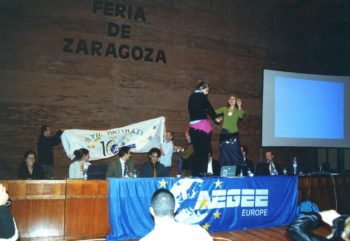
Golden Times: So how were your first AEGEE steps in Zaragoza?
Alberto: That winter in 1996 I found the right people. We had a Regional Meeting with some colleagues from the neighbouring antennae in Zaragoza and we also organised a New Year event in a ghost village in the Pyrenees – already with some participants from Europe. With a hand from AEGEE-Valencia, AEGEE-Madrid and AEGEE-Barcelona, we wrote our statutes and registered officially as association.
Golden Times: What were the biggest ups and downs and challenges for your antenna in the beginning? Finding members?
Alberto: It took in fact some time before things started to move at home. Breaking the barriers of scepticism and mistrust was not easy at all. In fact, I found more enthusiastic people, really wishing to see the world, in St. Petersburg than in my own city. At that time in Zaragoza University, there were hardly any student associations with international perspectives. Finally I found the right people, willing not only to receive but also to give, in the student office in the Faculty of Philosophy – which was also our office for the first years. Finding members after the first people went to the SUs was never complicated.
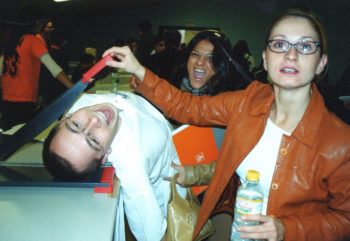
Golden Times: How was fund-raising, when no one knew AEGEE yet?
Alberto: Fundraising was not particularly hard, as we got some help from university. In any case it is true that with a bit of imagination, you can do a lot out of almost nothing. More than money, rooms, an office, good lectures and meetings with the institutions and private companies, plus lots of volunteering, really make miracles.
Golden Times: When did you sign the Convention d’Adhesion?
Alberto: The Convention d’Adhesion was signed at the Presidents’ Meeting in Aix-en-Provence in February 1998. It was a magic moment that I felt in every hair on the back of my neck, and it was followed with a great ovation. To go to Aix-en-Provence for the first time we got some economical support from our university. To get this support we had a nice talk with the vice-rector for international relations about the wonderful things we were planning to do and also mentioned that in case we couldn’t get any help for the trip, we were ready to hitch-hike.
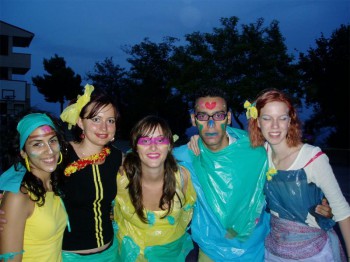
Golden Times: Your antenna developed pretty quickly after that…
Alberto: From 1997 on everything started to move a lot faster. To attract people we first organised a scuba diving baptism, a web design course, and with some help from AEGEE-Barcelona, we organised our first Summer University campaign. Some of our SU participants came back full of energy, becoming the core of the new board to organise the following events.
Golden Times: What were those?
Alberto: Our first two summer universities about ecology, two Youth for Europe exchanges with AEGEE-Kaunas and AEGEE-Thessaloniki, one more new year event in the Pyrenees – even where part of the CD was present – and one congress about international couples in Zaragoza, following the spring Agora in Barcelona in May 1999.
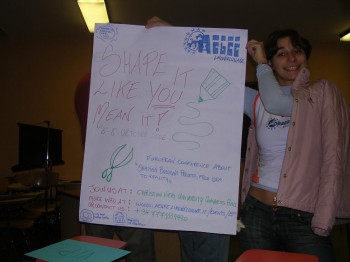
Golden Times: Oh, I remember that last one, I was there. What was your favourite event that you organised?
Alberto: It’s hard to choose only one. I think the first New Year event in the ghost village of Pano had a very special atmosphere. I was there among part of the friends who were with me in the Case Study Trips in Ukraine and Moldavia, plus the magic of the place itself. The first two Summer Universities about ecology were also something different as people really learnt something, apart from having fun.
Golden Times: What are your favourite memories and moments of your AEGEE time?
Alberto: I always loved the East and I was also active member of the East-West Working Group (EWWG) for a few years. The Case Study Trips to Ukraine, Moldavia and Transylvania were without any doubt where I had the best moments. The restoration work in Peter and Paul fortress in St. Petersburg during a Summer University was very special too, and learning how to organise and contacting companies and public institutions in Zaragoza to get the best for our SU was great.
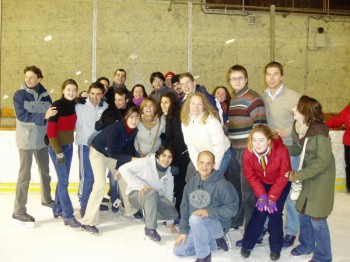
Golden Times: Can you tell a nice anecdote from your trips?
Alberto: During my AEGEE years I hitch-hiked thousands of kilometres, so when we organised the International Couples congress in 1999, instead of charging those sometimes unfair fees for Eastern and Western European, we fixed a zero fee for the ones that really deserve it. In that case, two participants who hitch-hiked all the way from Holland, were the beneficiaries. Apart from that, in every event there are a few nice love stories and broken hearts…
Golden Times: Are you still keeping contact with your AEGEE friends from the past?
Alberto: Yes, I keep in contact with some of them. I hardly met anybody in the last years because now that I have work and family obligations in two countries it is a lot harder, though modern communications make pretty easy staying in touch with little effort. The best I have left of the years in AEGEE are the friends I have here and there.
Golden Times: How has AEGEE changed your life?
Alberto: In one generation the horizon has been pushed much further. I work among people from all the EU as senior cabin crew in Ryanair. My family has become international, my daughter is bilingual Russian-Spanish and I had to face in person many of the difficulties and advantages we spoke about in that congress back in 1999. Still, despite I live far from home, my roots are where they always were and every day I read my local newspaper from Zaragoza. By the way, if that counts, it annoys me when I ask someone where he is from, and that person answers me with a country name instead of a city. And I think that nationalism sucks. Let’s ban all the visas, and let’s all speak Esperanto!
Golden Times: Final question: how did you feel when you heard that AEGEE-Zaragoza will organise an Agora this year? And will we meet you at the Agora?
Alberto: This is the second Agora organised by AEGEE-Zaragoza since I left. I missed the first one in 2003 completely as I was living in England at that time. It makes me feel really happy that there are people that year after year keep on doing a good work. This time yes I would really like to be present at least at for the opening!
Related Posts
1st August 2019
The Gallery of All Presidents of AEGEE-Europe
Here is the gallery of all Presidents of AEGEE-Europe - with photos of every one of them. Enjoy the list!

